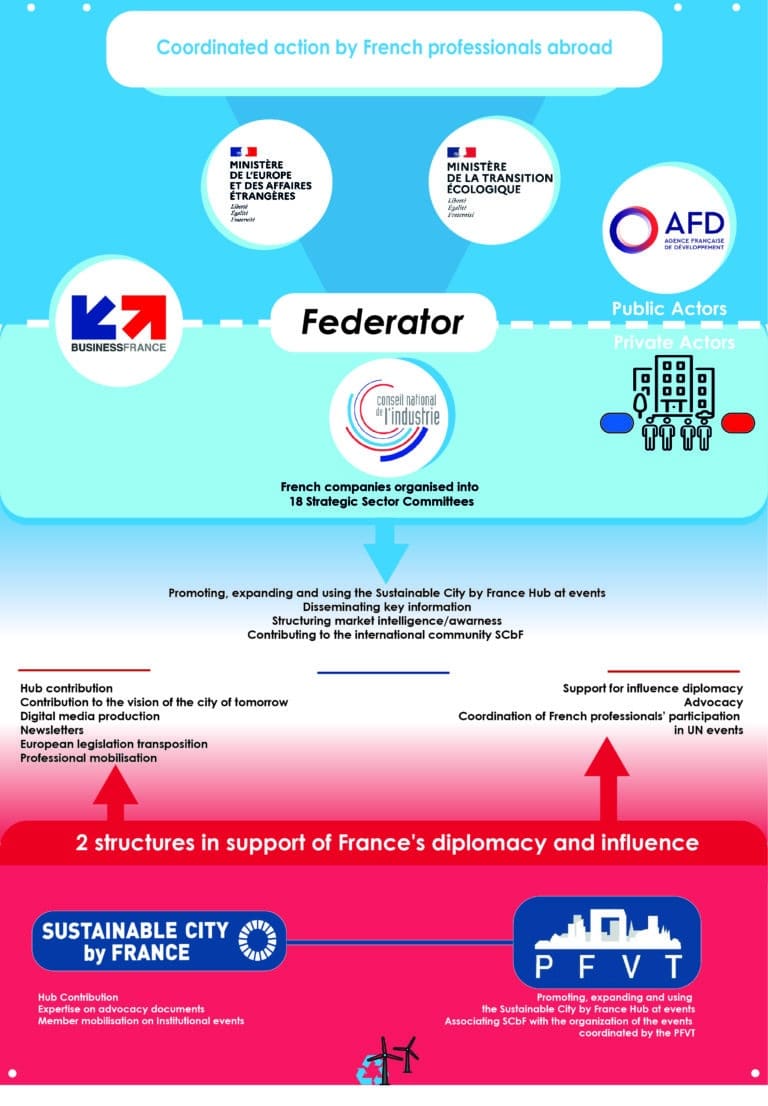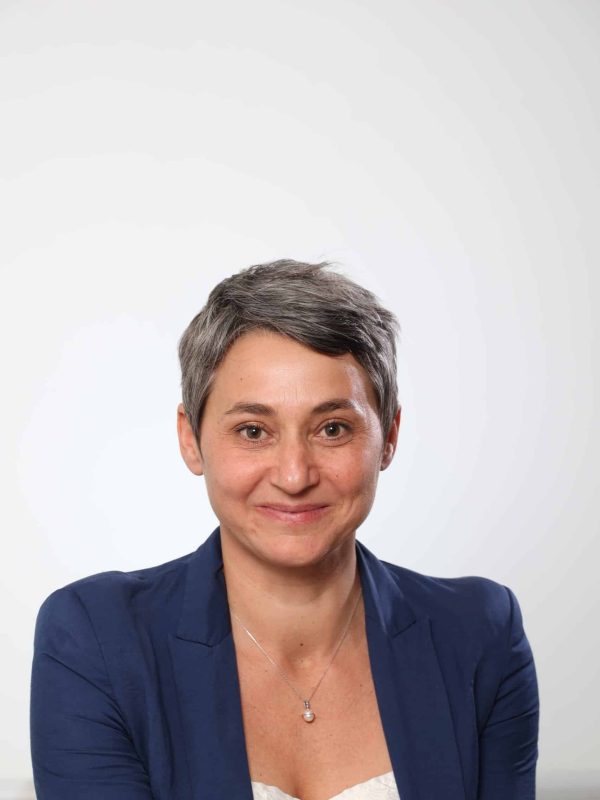Europe
Contribution of Sustainable City by France (SCbF) to the Horizon Europe Programme
Horizon Europe is the European Union’s framework programme for research and innovation in the 2021-2027 period. This new programme, which follows on from Horizon 2020, has a budget of 95.5 billion euros, making this EU project the most ambitious R&I programme in the world.
In this context, several competitive calls for proposals and European partnerships have been directly linked to the challenges of sustainable cities, in particular: Driving Urban Transitions (DUT).
The partnerships foreseen as part of the Horizon Europe framework programme are initiatives in which the EU and its member states engage with both public and private actors to jointly support the development and implementation of a programme of research and innovation activities.
The DUT partnership is based on three key pillars:
- Positive-energy districts
- 15-minute city
- Circular urban economies
The specific objectives of this partnership aim to:
- Promote inter- and transdisciplinarity, involving all stakeholders and approaches: technological, social, economic, cultural, governance of urban development, etc.
- Provide a response to the major urban issues, bringing together strategic Sustainable Development Goals (SDG) with public policies, by defining concerted and prioritised urban-action plans.
- Offer an environment for urban experimentation, knowledge capitalisation and cooperation between science and politics, beyond calls for projects, in order to achieve more effective strategies and strengthen both the implementation and scaling up of results.
The 100 Climate-Neutral and Smart Cities by 2030 mission
Among the five missions shaped by the European Commission to generate operational solutions in response to major global challenges, one is entirely dedicated to sustainable cities. This mission aims to support, promote and enhance 100 European cities in their systemic transformation to achieve carbon neutrality by 2030. These 100 cities have been designed as laboratories for on-site innovation and experimentation, the experience derived from which will be useful for all regions, in order to achieve the EU’s 2050 goals and improve sustainability and quality of life across the continent.
As part of these two axes of the Horizon Europe programme, Sustainable City by France works in close collaboration with the Ministry for Higher Education, Research and Innovation (MESRI/DGRI) and the Ministry for Environmental Transition (MTE/CGDD) in order to:
- Share information on calls for projects directly related to sustainable cities,
- Organise French advocacy before the European Commission to shape calls that are both favourable and complementary to existing national mechanisms (Regional Climate-Air-Energy Plan, Recovery and Environmental Transition Contract, etc.)
- Mobilise all stakeholders, and in particular the private actors, in order to promote the success of French responses to the various calls.
Since 2020, SCbF has participated in the French working group for the city mission and the DUT, alongside the MESRI, the MTE, France Urbaine, the PIN Ville (National City Information Point) of the Gustave Eiffel Univerity, and several urban communities (European Metropolis of Lille, the Pau Béarn Pyrénées Agglomeration Community, the Nantes Metropolis, representatives from the Ile-de-France and Occitania regions in Brussels, etc.).
A joint response from MESRI, MTE, ANCT (the French agency for regional cohesion), and Sustainable City by France to a “CIT-01” call is also underway, hoping to participate in the support that will be implemented across Europe with regard to the city mission. In particular, this will involve identifying the obstacles to carbon neutrality in France and considering which levers may be employed to facilitate the implementation of European objectives at a local level.
More information will be communicated shortly.
To find out more:
- All the information regarding the European research and innovation programme is available on the website: https://www.horizon-europe.gouv.fr/
- To stay up to date on the latest information on European programmes : https://www.pinville.fr/
For specific support responding to a call:
- Get in touch with one of the specialist national points of contact (NCPs): https://www.horizon-europe.gouv.fr/les-points-de-contact-nationaux-24230
International
Sustainable City by France positions itself as a support structure for French economic diplomacy, acting as a “do tank”. Its activities are designed to complement the advocacy carried out by the French Partnership for Cities and Territories (PFVT), as part of UN and African forums. In particular, its role is to identify, capitalise and share the best achievements and operational solutions to promote French know-how and expertise, promoting the development of conservative, resilient, inclusive, and creative territories, on a global scale.
With its manifesto, Sustainable City by France contributes to promoting a Franco-European vision of sustainable cities and territories, distinguished in particular from Asian or American “Smart Cities” in its:
- Reasoned approach to digital tools,
- Holistic understanding and expertise in urban issues,
- Care taken to include both stakeholders and residents in the fabric of the city, as well the attention paid to the most vulnerable populations in order to avoid any form of segregation.
Students of the “Governing the Large Metropolis” Master’s course at the Paris Sciences Po Urban School were commissioned by SCbF in 2021 to explore the French specificities of sustainable urban development, as part of a comparative study on a local, district-based scale (France, Sweden, South Korea, Colombia, and the USA).
To watch the restitution during the “Villes Durables en Action” event
SCbF’s international activities are defined annually by a steering committee made up of SCbF members active on an international scale. The steering committee drives the association’s strategic positioning and priorities for international action.
The international roadmap is then approved by the General Assembly during the presentation of the association’s programme of activities.
Sustainable City by France online HUB
The Sustainable City by France hub has been designed as a toolbox and a useful showcase for all sustainable-city professionals. Freely accessible and intended to serve general interests, the platform aims to encourage the replication and democratisation of actions in favour of environmental transition, both in France and abroad. The English version of the site offers non-French speaking visitors the chance to discover French achievements and methodologies in order to compare initiatives, find inspiration and identify relevant contacts to respond to local issues.
Designed as a real hub for sustainable cities, the platform is based on professionals’ contributions and supports the promotion of French know-how before foreign audiences.
This digital tool aims to be supplemented by a series of themed “Sustainable City by France” documents (e.g. former “Vivapolis sheets”) presented in the form of interactive PDFs linking to the portal and available in a printable version in order to promote these emblematic approaches and experiences.

To download the available sheets:
Sustainable City by France delegations
In 2022, Sustainable City by France is launching its first international delegation representative of all its stakeholders: State, local communities, experts, and businesses.
The aim is to take advantage of Sustainable City by France’s unique position and its capacity to represent the entire ecosystem of city professionals in order to initiate an in-depth dialogue with foreign partners:
- Discussing visions and conceptions of the sustainable city.
- Identifying local needs before calls for tender.
- Preparing the response to be provided by French actors, promoting consortia of actors.
- Initiating, strengthening and/or relaunching diplomatic cooperation and decentralised cooperation actions.
The first “test” delegation will be organised in Poland at the end of 2022 and preparations will give rise to several themed working groups, organised by the international steering committee.
For any questions or requests related to European and international matters, please reach out to: contact@francevilledurable.fr
International partners
In order to expand its ecosystem and establish its international legitimacy, Sustainable City by France is gradually surrounding itself with a network of international partners. The aim is to initiate the sharing of experiences and expertise, which will then nourish the vision of Sustainable City by France and open up new perspectives to its members.
The first international partners to join the Sustainable City by France network are Resilient Cities Network and the Danish Embassy in France.
The full list can be found on the Our partner’s page of the portal.
Participation in professional events of international importance
Sustainable City by France has partnered with Business France and helps to promote French know-how under the “Choose France” banner at international trade fairs and events – for example, at the “Barcelona Smart City” trade fair, in which SCbF has been a contributor since 2016.
As part of this partnership, Sustainable City by France also runs a short training course every year at all Business France offices around the world. The aim is to update their understanding of the challenges faced by sustainable cities and share useful language elements for the promotion of the French vision.
SCbF is also leading the “resilience” group for the French Partnership for the City and Territories (PFVT), in preparation for World urban forums, and is part of the French delegations working as part of UN forums.
Travel abroad is organised according to the added value identified for the association and is always sponsored by Business France, a member, or another partner. When travel is not considered a priority by the steering committee, SCbF can still contribute to the French dynamic by providing digital content and by making the Sustainable City by France portal available to promote the French experience.
For any questions or requests related to European and international matters, please reach out to: contact@francevilledurable.fr











